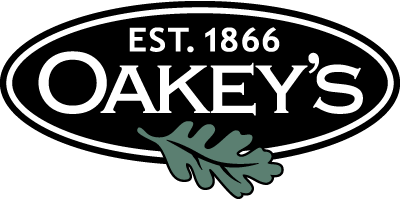More Than a Dark Suit by Sammy Oakey
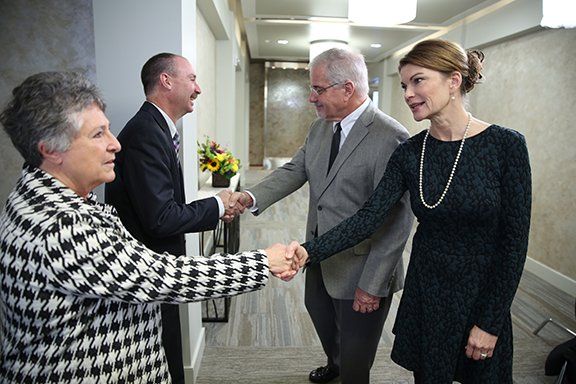
By Sammy Oakey
•
April 7, 2022
While it makes me feel as old as Natural Bridge, I sometimes find myself using the words “When I first came to work at Oakey’s . . .” It’s usually to illustrate how something has changed in my 45 years of working in the funeral service. I’m sure some of the younger staff members automatically roll their eyeballs when they hear that phrase emanating from my mouth, but I truly believe we can learn from our past. When I ruminated about “ancient history” to some of our associates last week, it had to do with the continuing shrinkage of visitations in our society. Just as consumer goods are sometimes decreasing in size during this time of “supply chain issues” and inflation, funeral service professionals all agree that family visitations have likewise been downsized. When I first came to work at Oakey’s (there I go again!), many visitations were for two days and nights. I could almost always tell which ones were for two nights, because the flowers on the casket began drying out by the day of the funeral! The longer visitation periods gave family members, living out of town, an opportunity to attend at least one of the visitation nights. It also provided more time between the date of death and the actual funeral day, giving funeral homes, ministers, cemeteries, burial vault companies, floral shops, friends, and loved ones additional time to prepare for the funeral service. This is a distinct contrast to what we often see today with families attempting to rush the arrangement process, scheduling a visitation and funeral within a few days of the decedent’s last breath. While it is not up to funeral directors to judge what is best for a particular family, quite often I think it may be better for survivors to take their time and not attempt to cram all of the activities into such a brief period of time. I often think African Americans have the right idea, as the Black culture usually schedules funerals about a week after the death occurs. Families we meet with are often exhausted following days, weeks, or even months of dealing with a loved one’s illness; a buffer period of 5-7 days before the funeral or memorial service can often give them time to ‘refuel.’ Visitation shrinkage reflects visitations going from the aforementioned 2 days and nights to one day and night to two hours before the funeral. I have even seen some obituaries where families will receive friends for ONE hour before the funeral, and (just this week) saw one death notice stating the family will receive friends at the cemetery for thirty minutes prior to the service. What’s next…fifteen minutes? From past experiences, I can state that if a visitation is for two hours before the funeral, very few people will attend for the first 60-90 minutes. Most everyone will come in the thirty minutes prior to the service, as they wish to be present for the visitation AND funeral without hanging around for two hours. I don’t say this to be harsh or judgmental, it’s just the way it is. I would probably do the exact same thing if I were planning to attend a visitation before a funeral. I also worry about how grueling this is on family members, especially the elderly. If a family is going to receive friends from noon to 2 PM and then have the funeral at 2, the family typically comes in about an hour prior to noon for viewing the decedent and acclimating themselves to the room. They will also bring photos and artifacts that need to be set up and displayed. Following the funeral, the family will go to the cemetery for the burial, which means a family is going to be engaged from 11 AM until about 3:30 PM, depending on the length of the service. And even THEN, the family is often committed to having friends and other family over to the home for a big meal. Taken together, all of these activities could wear down an Olympian! I’m not going to be one of those crusty old timers who thinks that everything was better back in “the old days,” but I do think that society’s perception and valuation of a funeral visitation has changed over the past half century, and not for the better.
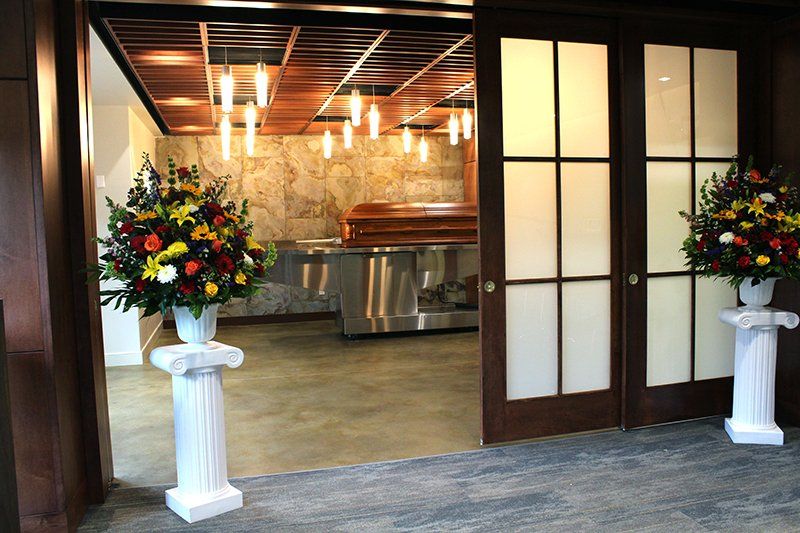
By Sammy Oakey
•
June 19, 2021
For 155 years, our firm has served the Roanoke Valley with dignity, honor, and professionalism. During that time, we have very rarely said “no” when asked by a family to assist them in making arrangements for a loved one. But there are rare occasions where we must reply in the negative after learning of certain circumstances. Most of these would involve the family selecting cremation as a method of final disposition for their loved one, but not being able to locate the next of kin for signing purposes. As everyone knows, we live in a very litigious society. Like every other profession, funeral homes must always be careful and not expose themselves to potential liability. And when you’re dealing with an irreversible process such as cremation, there is no room for error or exceptions to rules. Whenever we meet with a family and learn that they wish to choose cremation for their departed kin, we run down a list of who can authorize the cremation to take place. If the decedent had filled out paperwork making someone their “Appointment of Agent,” that act supersedes any blood survivors. Whomever they made their appointment of agent has the power or responsibility to bury or cremate the person who died. If this paperwork was not completed, then we automatically look toward the spouse of the decedent to handle arrangements and sign off on any paperwork. If there is no spouse, then the next level would be children of whomever died. If there are no children of legal age, then the next levels would be parents, and then siblings. The problem we have seen occur happens when there is a spouse that refuses to sign for cremation. Or, if there is no spouse and several children, we must have EVERY child sign for cremation. We do, of course, allow for signatures by fax or online (as long as they are properly witnessed). But if there are five children and only four agree to sign for cremation, then we will simply not cremate a body. We do not do this to be cruel or overly businesslike, we do it to protect the other family members and ourselves. While we are actually exceeding what is required by Virginia law, we are ensuring that no one has grounds for a lawsuit or the opportunity to denigrate our firm. Recall my prior example of five children surviving but only four signing for cremation. It is entirely possible the lone child who did not sign for cremation would attempt to sue Oakey’s or their siblings, stating they did not get a chance to say ‘goodbye’ to their parent, or that they do not agree with cremation and are having nightmares about this process. While they would not have a strong case, this son or daughter could go to the media and plead their case that Oakey’s did not provide them with some final moments with their mom or dad. Trust me, this stuff happens. Even worse, there are some families that are not truthful with us about who the next of kin is or how many children there are. We have even been lied to about whether someone was actually married to the decedent! It is my general rule that if a family gets along with each other and have bonded through love over the years, a death can often bring them closer together. Conversely, if there have been fractures and fissures between family members over time, then a death can often be the breaking point, resulting in animosity, accusations, and allegations. I have even seen fistfights break out during the arrangement conference! One I distinctly remember involved children of the deceased who began fighting over who got the grandfather clock, literally, just hours after their mom died. We never like to say “no” (I think that was a double negative, but you catch my drift), but if saying “yes” opens our organization up to bad publicity or legal threats, then we must be honest and explain our position to the family. Often, obtaining the necessary signatures is just a matter of time. If there is no appointment of agent and no spouse and there is a problem obtaining all of the children’s signatures — there can be times when a son or daughter is on a cruise, in the hospital, incarcerated, or unobtainable — we can place the decedent in a cooled area designed to retard decomposition. This act buys us time to obtain everyone’s authorization. Sometimes, these situations force us to also double as detectives as we try to find the next of kin. But, as I often say, you cannot “uncremate” a body. That’s why it is important we perform due diligence before ultimately signing off on a cremation. As much as we want to say “yes” to any request we receive from a grieving family, there are rare occasions that we must regretfully say “no”.

By Sammy Oakey
•
December 30, 2020
My grandfather, John Oakey used to tell me about his father, who worked at Oakey’s during the flu epidemic of 1918-19. The one thing I can recall from our conversations is that my grandfather told me his dad worked for several months, in a row without a day off, during that health crisis. I think the only reason the topic came up was because I was moaning about not having a day off in a week and he wanted to let me know what an extended time without a day off was REALLY like. Over the past ten months, I often wish I had asked my grandfather (“Pops”) more about that time in history. While he was just a kid then, I’m sure he could have told some pretty compelling stories about living through such a difficult time in history. By the same token, all of us who have made it through this anxiety-ridden year of 2020 will have fodder for dozens of stories to tell our children and grandchildren for decades to come. Toilet paper shortages, face masks, lockdowns, and downright fear have all been a part of this event known as COVID-19. I often sprinkle bits of humor into my blog entries in order to keep things from getting too “heavy,” but I’m not doing that this time, because I (and everyone I work with) can testify that the past year has indeed been heavy. What we have seen from the view of death care professionals is difficult to put into words: Watching entire families being ravaged by the Coronavirus; hearing clients tell of losing loved ones and not being able to be with them during their illness or death; telling families they can only have ten people at a visitation or funeral; or not even knowing whether to embalm COVID positive bodies because the World Health Organization (WHO) said not to while the Center for Disease Control (CDC) said it was okay to do so. Looking back, the entire scenario seems like something out of a sci-fi movie. I know there will be those who scoff at the virus, and state that it is no worse than the flu or a bad cold. They would be quite wrong, myself and 149 co-workers will gladly attest to this fact. Over my 44 years here at Oakey’s, I have seen a lot of maladies, but none quite like this horrible Coronavirus. This insidious, unseen killer has forever changed the world we live in. And while it has only been ten months, I have forgotten what normalcy feels like. Through this entire drama, I am comforted by knowing that the men and women I work with are true heroes. Not a single one has backed down from the challenges we face on a daily basis. Sure, we are all pretty nervous about COVID-19 — at times, we are downright scared. But knowing that there are families in our community who are counting on us to help them after losing a loved one, is what keeps us going. The vaccine on the horizon also motivates us and lets us know an end is in sight. It is said that the true character of a person is revealed during times of crisis. If this is true, and I believe it is, I can honestly say that the character of each Oakey’s associate has been weighed in the balance and not found wanting. For the time being, we will all keep on wearing our face coverings and giving elbow bumps. When this thing is over and done with, I can honestly say I will never take everyday pleasures for granted again. Going out to eat, bowling in my Wednesday night league, attending church, and being present for every Roanoke RailYard Dawgs hockey game will bring me more joy than ever before. We will make it through to the finish line, and we will be stronger for it. Happy New Year, everyone.
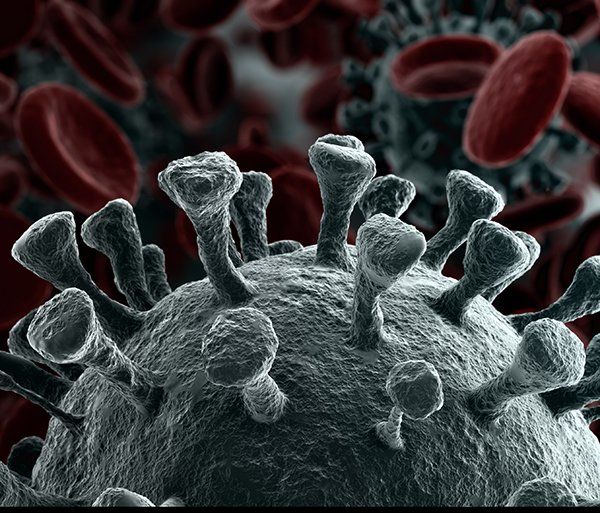
March 26, 2020
Spring has always been my favorite season. The rebirth in nature, as well as the thaw from chilly temperatures, warms my heart and soul. However, there is a real chill in the air as spring of 2020 blooms. I really can’t remember when I first heard about the coronavirus; it must have been sometime in January. I obviously didn’t pay too much attention to it, especially with most reports downplaying the significance. In February, the amount of ink devoted to the virus in the newspapers (I still love my paper!) increased, and as the month progressed, I began to take more notice. I am an admitted hypochondriac and germaphobe, so as March roared in I began dreading opening up The Roanoke Times or the news apps on my iPad. And now here we are with toilet paper flying off the shelves, folks being urged to stay in their homes, and anxiety embedded on everyone’s faces. I have been through the swine flu, bird flu, 9/11, and the Cuban Missile Crisis, but I would have to say the current pandemic seems to pose more of a threat to our nation than any single event I can remember. I surely do not recall ever being looked at as if I shot the Pope when I recently coughed in a Kroger grocery store. To say that COVID-19 has affected the funeral business would be a classic understatement. We have basically seized holding visitations and funerals as no one wants to limit attendance to just 10 people. Most requests are now for cremations, private graveside services, and memorial services to be conducted “in the future.” Heck, sometimes I wonder if there is even going to BE a future! Yesterday, WFIR-AM, WSLS 10, and WDBJ7 all conducted interviews here at our downtown chapel. The reporters all wanted to know how the coronavirus has changed the way we do things. I should have asked them if they had several hours because there is not one facet of what we do that has not undergone change in the past month. Meeting with families, taking death calls, bringing decedents back into our care, conducting services, planning staff meetings, and even how we clean our facilities are all different than “the old days.” I find myself waking up at 2:30 in the morning with the fear that the coronavirus could sicken half of my workforce while doubling our workload. We find ourselves having difficulty obtaining the necessary items for our business. I worry our cooler, which can hold 36 decedents, might not be large enough in the event of massive casualties. I even recall my grandfather talking to me years ago about how HIS father worked six months in a row without a day off during the flu epidemic of 1919. So what’s next? Nobody seems to know. Social distancing seems to be paying off, but more Americans need to buy into this practice. I’ve already concluded that my 401-K will probably have about $11 in it by the time this crisis is over, but that’s nothing compared to the tons of small businesses devastated by a tiny virus. I’ve come to realize that I had no idea how good I really had it, pre-COVID-19. I could travel anywhere, watch sports on TV, hug/shake hands, go bowling on Wednesday nights, attend church, or simply visit a restaurant. Yep, I took those simple pleasures for granted, and now I wake up every day to what the new infection/mortality count is. Our organization will continue to be committed to making tough times just a little bit easier for valley residents to bear. While I’ve always had a great amount of sympathy for grieving families, it has increased exponentially for anyone who has to lose a loved one during this pandemic. Not being able to have a visitation or funeral where friends/relatives can express their love is beyond my comprehension. I know we will eventually return to a sense of normalcy, and I hope when we do, I will appreciate it like never before.

January 21, 2020
Everyone knows that the postman has a mantra about how the elements will not prevent him or her from delivering the mail on-time. Everyone also knows that there are times when that’s just not possible, and weather conditions simply prohibit certain areas from safe entry. Most professions have the luxury of simply closing down in the event of a flood, blizzard, or ice storm but not funeral homes. We are in the same category as the police, firefighters, or rescue squad personnel. Can you imagine contacting a mortuary after the death of a loved one and getting no answer? Or getting an answering service telling you that the funeral home you called will not be open that day or night? Our staff has to be ready to go 24/7/365. Our 4 x 4 removal vehicle has gone through some pretty bad conditions in order to bring decedents back into our care. Even in the flood of ’85, we were able to successfully go on every death call we received. Saying “no” is simply not an option, and our staff understands this commitment to the families we serve. Walking through a few hundred feet of mud in a suit is certainly not for everyone, which is why I look at our removal teams as true superstars. And it’s not just a death call that calls us out into the bad weather. Our staff works hundreds of funerals a year, whether it’s 90 degrees or 10 degrees. Most attendees of funerals don’t stop to think about how long our attendant has been standing in that hot or cold parking lot before they drive into it. For every funeral, we man the lot for at least an hour, and sometimes longer. Even with an umbrella, there’s no way to keep from getting soaked when you stand in a downpour for an hour. And as for graveside services at cemeteries? I maintain that a graveyard is the hottest place in the summertime and the coldest (and windiest!) place in winter. We post our attendants at both gates of a cemetery for an hour before the service begins, as well as the funeral director in charge of parking posted near the grave. Essential foul weather gear for any funeral home employee includes an overcoat, umbrella, rubber overshoes, scarf, and gloves. I take a lot of ribbing for wearing earmuffs on cold days, but as a non-hat wearer, I swear by the comfort those muffs give me! On days when the mercury hits 80, we allow our outdoor staff to remove their suit coats, which helps a bit. Of course, when we created that policy, some of the old-timers complained about how they had been working funerals for (fill in the number here) years and never took their coats off! I’ve been in cemeteries where it was raining so hard that workers could barely keep the grave pumped out in order to inter the burial vault and casket. I’ve seen snowy days in country cemeteries where the drifts were so high that they covered up grave monuments. And while umbrellas do come in handy on rainy days, it’s probably not a great idea to be holding one in the air when storms are producing lightning! Oakey’s was the first funeral home in this area to provide blankets at the cemeteries for family members to use on cold winter days, and bottled water to hand out in the summer. One time, I had the bright idea to order a bunch of hand warmers that I thought we could provide to families during graveside services. Unfortunately, a co-worker and I were trying to fill the darned things with lighter fluid but we ended up setting a bunch of papers on my desk on fire! Needless to say, the hand warmers never saw any action after that. I’m not bemoaning the various weather conditions we face on a daily basis, as each funeral home worker knows about the meteorological extremes they will be facing when they enter the profession. I AM asking the general public to recognize the various elements funeral home staffs must endure, and perhaps give a pat on the back or a kind word to us as we freeze or melt while performing our jobs.

June 9, 2019
Posted on June 9, 2019. “If you’re not here in the next sixty seconds, I’m leaving without y’all!” As I texted those words to two of my friends on Saturday, I (and probably they) knew that I was bluffing. But we had tickets to see guitarist Laurence Juber in Northern Virginia that evening and I knew that our schedule was going to be tight. Several minutes later, my pals showed up and we headed up the dreaded I-81 to catch an incredible concert. Everybody in my circle of family and friends knows that I am a true stickler for punctuality. If we agree on a certain time, I expect you to be present and ready at the appointed hour. Whether it’s for a concert, going out to eat, a sporting event, or simply a walk on the greenway, BE ON TIME! This mantra drives my wife and son crazy, but it’s now an inherent part of my DNA and I’m too old to change. Heck, I’m the one on time, so why should it be ME that’s expected to change? My dad was like this too, and I can remember him pacing and stewing as my mom was still getting ready to go out for a function. Since I obviously “got” this trait honestly, I’ve been aware of it for decades. Not only do I have to be on time, I feel that if I’m not early, I’m actually tardy! While it may be a hereditary thing, I also feel as if my chosen vocation of funeral service may have played a huge part in my propensity to live by the clock. Almost everything we do at Oakey’s has to do with time. What TIME is the funeral? What TIME is the family coming in to make arrangements? How much TIME do we have left to get the obituary in the newspaper? Is it TIME to gather the relatives into the family room and close the casket? While I know there have been times we started funerals late, I take it as a personal failure if the clergy does not begin the service at the exact minute the attendees expect it to start. Kin of the decedent can probably see my stress level rise as they tell me “We’re going to have to begin the funeral late because (insert name of the family member here) isn’t here yet.” It certainly doesn’t help when they find out that the late relative is still 25 minutes away from Roanoke! And there are times when someone will ask me a time-related question that I have no idea how to answer. When calling the police department for an escort to the cemetery, the dispatcher invariably will ask “What time will the funeral be over?” Well, I’m certainly not going to ask the preacher “How long are you going to go today?” and I’ve seen services last anywhere from five minutes to two hours! I’ve been on church funerals where the reception committee hosts a luncheon after the cemetery committal and they will ask me what time I think friends and family will be getting back to the church for the meal. That’s impossible to pinpoint, although I will give them a guesstimate. Talk about stress levels rising: we schedule our services at 10 AM, noon and 2 PM at our chapels in order to keep them from running into each other. Since the average time of a funeral is about 40 minutes, this works out well 99.5% of the time. But remember earlier when I mentioned funerals that can last two hours? Can you imagine clock-obsessed Sammy sweating bullets on a 10 AM service that is approaching 90 minutes, as attendees for the noon service begin to filter into the building? Heck, I get a queasy feeling in my stomach just THINKING about it! I’ve even heard stories about my great-grandfather walking into the back of the chapel and giving the hand-across-the-throat motion to the minister, to let him know that it was time to begin wrapping up his remarks! Pretty sure that wouldn’t happen today! I know “stuff happens” and delays can occur. Flat tires, traffic jams, sudden illnesses, accidents, and emergencies are part of life. But habitual lateness drives me batty, as everyone who knows me well can attest to. So blame my dad, blame the funeral profession or blame my OCD tendencies. But just know that there’s no such thing as “fashionably late” in my vocabulary.
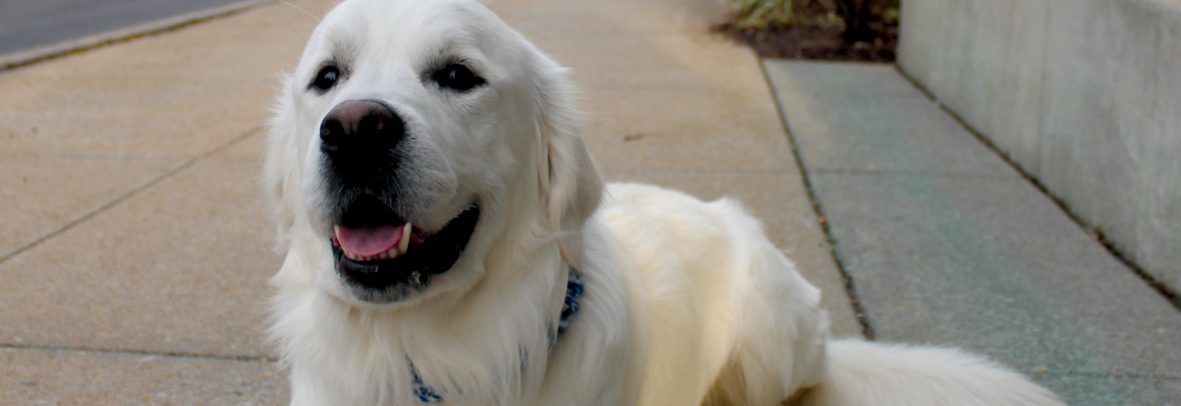
December 27, 2018
Posted on December 27, 2018. With 42 years under my belt and a reputation for being somewhat reluctant to change, you can imagine my reaction in 2016 when my son acquired a dog he pronounced would one day be a “grief therapy dog” at Oakey’s. Heck, I wasn’t even sure what a grief therapy dog WAS, so I sure as heck wasn’t immediately keen on the idea of allowing a canine to mix with our grieving families. Sam spent the next couple of years at mortuary school in Nashville, and I figured by the time he returned to work in Roanoke he would have shelved the idea of his English Golden Retriever coming to work every day at our family firm. Wrong! And that wasn’t all I was wrong about: Sam’s dog, Ragnar has been an incredible success with every family requesting him! A member of my funeral study group from Columbus, Ohio related his experiences at Schoedinger Funeral Home with their grief therapy dog, and how the idea had caught on in a massive way. So I was willing to give “Rags” a shot here to show me he could actually help families at their hardest time. It didn’t take long before I was telling young Sam how wrong I had been to approach the idea of a grief therapy dog with such skepticism. Ragnar is now being requested multiple times a week and has been a calming influence on dozens of our families. The idea is actually quite simple: our funeral directors make families aware of the availability of Ragnar and ask if each family would want Ragnar to be present for a visitation or service. We explain that the presence of a grief therapy dog can be beneficial to all in the immediate area, and that stroking a dog can lower blood pressure rates, stress, and ease respiration. Not just any dog can do this; my own border collie mix Stella would probably spaz out everyone in the building with her nervous energy! Ragnar is actually still in training to receive his official certification as a grief therapy dog, but is getting plenty of practice until then. While I have not heard one negative thing about the concept, Rags has received tons of compliments, kind letters, and even gifts from grateful relatives of decedents. All of our staff members have fallen in love with this big, white creature who has one of the best dispositions of any animal I have ever seen. He seems to know just what to do when he is on the job, and has a particular affinity for kids. But Rags is equally adept at putting a smile on the faces of seniors and those with special needs.

March 22, 2018
Posted on March 22, 2018. A member of my study group recently came up with a theory, one I feel has a lot of merit. His hypothesis is that we, as funeral service professionals, are attempting to offer families we serve TOO MANY options. At first, this sounds ridiculous. Shouldn’t we pride ourselves in giving consumers the highest number of alternatives in which they can memorialize their loved ones? Isn’t this a classic case of “the more, the better”? Well, my former Rotary Club had an informal motto we used whenever a speaker would ask us the length of their speech: “Less is More.”

March 19, 2018
Posted on March 19, 2018. That comment, or a variation of it, is probably the single biggest question or complaint I get at Oakey’s. It comes in the grocery store, in church, and on the comment sheets that families use to respond to me about our quality of service. It comes in phone calls, letters, or personal interactions on the the Roanoke Greenway or at hockey games. I can certainly understand why a family might be curious or even annoyed about this topic. Someone they love has just passed away, and a stranger is on the other end of their phone expressing their condolences and asking about embalming permission. The answer is one I am proud to recite as it showcases yet another example of the high level of service Oakey’s is known for. Many (probably MOST) funeral homes these days do not have an on-duty staff at night; if a death occurs at a hospital, the funeral home will simply leave the decedent in the morgue overnight and send an employee to pick up the body the next day. These funeral homes use “on call” staff members only to go to a home or nursing facility when they are notified about a death there. Some even contract out body removals to a third-party agency. At Oakey’s, we do things very differently. With no disrespect intended toward the fine hospitals in our region, I would not want my loved one to be taken to one of their morgues and left overnight. A morgue is cold, dark, and usually has other bodies in close proximity to one another. Having a contingent of our associates working all night long gives us at Oakey’s the ability to respond with swiftness and dignity to each and every death in which we are notified. Whereas many other funeral homes only send one employee on a “removal,” our firm sends a minimum of two to carefully bring the decedent back into our care. Again, our family believes that dignity is a key ingredient to everything we do. This certainly includes the manner in which we physically take custody of a recently deceased individual. I know I have not even begun to answer the aforementioned question yet, but I feel the average person needs a primer in order to have a full understanding of what happens when we receive a phone call informing us that our services are needed. Our policy is to contact a family as soon as we are notified by a hospital, hospice worker, or nursing/retirement community about a death. The main reason for this initial call is to establish whether or not the next of kin wishes for their loved one to be embalmed. It’s a fact that the sooner a body is embalmed, the better the results will be. However, if a family is considering cremation or anatomical donation, embalming would simply be an unnecessary expense. This is the crux of that first call we make to a family, in addition to expressing our sympathy for their loss. Unfortunately, we are often notified about a death by a hospital several hours AFTER the person has breathed their last breath. In the middle of the night, this often results in our making a call to a family right as they are attempting to go back to sleep after learning about a death. Needless to say, this has upset a number of folks in our community, and they have certainly let me know about their strong feelings. Thankfully, their queries allow me to explain exactly WHY we make the call that can sometimes come in the middle of the night. After hearing “the rest of the story,” families have a better understanding of our reason for calling, but they also go away reinforced they received the superior service that our company has provided for 152 years now.

March 14, 2017
Posted on March 14, 2017. It’s been building for some time. Gaining momentum. And now exploding with impressive force. Nope, I’m not talking about anything political or weather related. I’m referring to a trend in the death occupation (I HATE the term “death industry”) that every funeral home is seeing, families choosing Saturday for the funeral or memorial service of their loved one. Sure, Saturdays have always had plenty of funerals, but nothing like the increase we are currently experiencing. Usually, families we serve will choose to have a ceremony two or three days after their loved one’s passing. That gives plenty of time for the cemetery, florist, newspaper obituary, and minister to be prepared for the service. Within the last five or ten years, though, families have decided that Saturday is the best day for a funeral, no matter WHEN the decedent died. Reasons for this trend are myriad, with the biggest one being the convenience factor. Obviously, a Saturday funeral or memorial service keeps most attendees from having to miss work or school. It also allows out of town guests plenty of time to drive to and from the site of the rites. In addition, most cemeteries in our region are not open for burials on Sunday. Consequently, our average number of funerals Monday thru Friday is between three and four. On Saturdays, however, we are averaging between five and six services. And many of those ceremonies have been set for days or even weeks! As I write these words on a Monday morning, we already have two funerals awaiting us this Saturday. Our firm can accommodate about eight funerals in a day, but anything over that begins to tax our facilities, motor equipment, and manpower. We could probably have ten services in a day if they were all spread out so that our staff could “double” over on them. That is, have the same crew work a 10 AM and a 2 PM ceremony. Unfortunately, everyone seems to want their loved one’s final rites to be around noon, give or take an hour. All funeral service professionals including myself certainly knew when we chose this occupation, it meant plenty of nights, holidays, and weekends. But trying to get off on a Saturday anymore would be equivalent to my great-grandfather trying to take a day off during the flu epidemic of 1918. My granddad told me countless times about how his father worked for four months without a day off. So I guess I really have no reason to complain, do I? Anyway, I’ve worked eight out of the past ten Saturdays, and desperately want to be off on Saturday, March 25th in order to attend a reunion of the cast of “The Waltons” television show in Schuyler, VA. All but one of the “children” will be there, as well as the actress who portrayed the mother on the series. That particular show rarely had cliffhangers, but it’ll certainly be one for me to see if I can sneak off on a Saturday in two weeks!
